I wrote a commissioned article for Tencent Games last week “Intangible Cultural Heritage and Digital Games”-as some ideas struck me while writing it I’d be happy if I can circulate it more widely if Tencent let me (the first stage is internal/company discussion).
Category Archives: virtual heritage
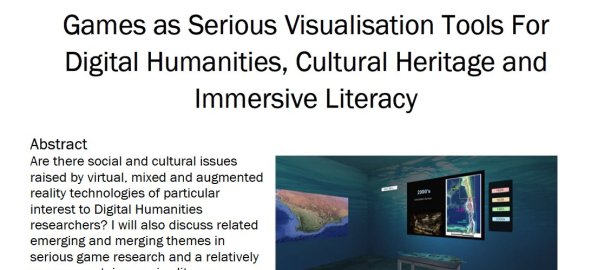
Invited Talk in Austria (virtually)
I’m giving a virtual lecture for DHGraz Wednesday 6 October 2021 (tomorrow): “We’re delighted to welcome @nzerik this Wednesday, who will open our Lunchtime Lecture series with an online talk on “Games as Serious Visualisation Tools For Digital Humanities, Cultural Heritage and Immersive Literacy”
More info: https://informationsmodellierung.uni-graz.at/de/neuigkeiten/detail/article/online-lunchtime-lecture-30.-juni-2021-1200-uhr/
Not recorded but slides are here https://www.slideshare.net/nzerik/games-xr-dhgraz-talk-06102021
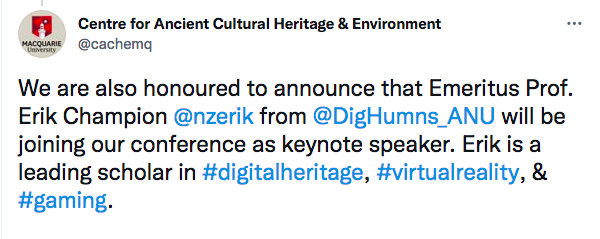
Keynote and CFP: Living Digital Heritage
Call for papers!
Living Digital Heritage Conference: “Integrating the Past into the Present and Future”
Friday 5 – Sunday 7 November 2021, Sydney/Virtual
Hosted by the Centre for Ancient Cultural Heritage and Environment (CACHE), Macquarie University
If interested please send your abstracts (panel or paper) to https://event.mq.edu.au/living-digital-heritage by 1 October.
I am happy and honoured to say that I have been invited to keynote, thank you to the organizers and for their tenacity in running this conference.

Virtual Heritage: How Could It Be Ethical?
Latest book chapter in the works:
Virtual Heritage: How Could It Be Ethical? Invited chapter for The Routledge Handbook of Heritage Ethics, Andreas Pantazatos, Tracy Ireland, John Schofield and Rouran Zhang (eds.), Routledge, 2023.
Ranging from modified adaption of commercial games (game mods) to multi-million dollar 3D visualizations and web-based projects, virtual heritage projects have showcased cutting-edge technology and provided insight into understanding past cultures. While the research field of virtual heritage (virtual reality and related immersive and interactive digital technology applied to cultural heritage) is several decades old, its specific ethical issues have not been extensively addressed.
Six issues will be discussed in this chapter: cultural ownership; the depiction of humans no longer with us; obsessions with photorealism rather than the complex topic of authenticity; environmental costs; accidental social alienation; and the gamification of serious, traumatic, or personal content.
Australian Cultural Data Engine-2 year LIEF
Just been given the green light to be officially on the following #ARC #LIEF grant: “Australian Cultural Data Engine for Research, Industry and Government” (announced in December but took this long):
“…Australian Cultural Data Engine for Research, Industry and Government. The project aims to develop an Australian Cultural Data Engine (ACD-Engine), which will be an open software engineering facility that interacts with leading existing cultural databases in architecture, visual and performing arts, humanities, and heritage to build a bridge to information and social sciences. The ACD-Engine will unify and expand these disparate and previously unconnected systems to allow advanced analysis techniques to be performed. It will deliver innovative and searchable formats that ensure interoperability, improved search, interactive design and interpretation aids that will benefit the policy and planning for national and international alignments between researchers, industry and government.”
This will be my fourth Australian Research Council grant (Chief Investigator)* since 2018. The University of Melbourne leads this grant, it runs for two years.
*Also an expert advisor on 5-year ARC Indigenous Discovery grant.

Virtual Heritage: A Guide
“Virtual Heritage: A Guide” is published and open access!
Why did we write it? For all those interested in an introduction to virtual heritage, but facing steep purchase costs for academic books, so it is especially suitable for university undergraduate courses. Download what you need, for free.
And given it was written from go to whoa in less than a year and to a tight word limit, I am very grateful to the authors for their time…
Cite: Champion, E. M. (ed.) 2021. Virtual Heritage: A Guide. London: Ubiquity Press. DOI: https://lnkd.in/gNkNWiB. License: CC-BY-NC.
Advisory Board setup
A major game company (I’d say a global company, not in Australia) invited me to quote/ setup an international advisory board in relation to intangible heritage and digital games to meet annually or biannually virtually or in reality. It is a bit of a challenge looking forward to estimate the budget in this time of pandemics, lockdowns, and border control issues.
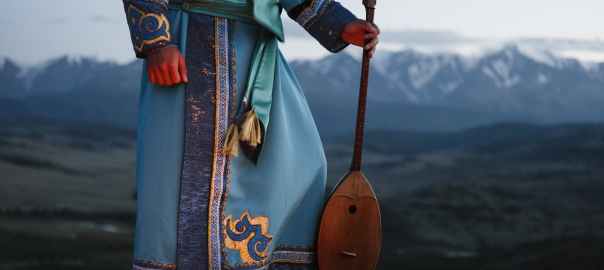
digital games and intangible heritage
If you have or know of digital games that helped in the “regeneration” of intangible heritage, as well as related organizations, projects and websites or organizations, please let me know…I have been asked to present on this topic on Monday 5 July to overseas gaming companies and academics..
Here was my initial beginning list (woefully incomplete but will soon expand):
Heritage organisations
- UNESCO Chairs … I am investigating, most lists of Chairs and Networks are a little out of date and a few seem to have changed or expanded their remit.
- Historic Urban Landscapes [UNESCO-associated]-none I know of use digital games but I think that would be useful…
- ICOMOS none I know of but it is a huge association.
- Europeana/CARARE/ARIADNE are more into digital archives/preservation?
Game organisations
- The International Game Developers Association (IGDA) Serious Games SIG http://www.digra.org/the-association/
- Games For Change (https://www.gamesforchange.org/ Board)
- Digital Games Research Association – DiGRA http://www.digra.org/the-association/chapters/united-kingdom-digra-chapter/
- VSMM http://vsmm.org/ (website has problems, I think I am still on the board of directors and I am not sure what the current status is)
- Serious Games for Cultural Heritage: the GaLA Activities appears to be finished..
Universities Research or Courses
- Skövde seems to be entering this area, Masters degree: Digital Narration: Game and Cultural Heritage https://www.his.se/en/education/game-development/digital-narration-game-and-cultural-heritage-masters-programme-digba/ Academic: https://www.his.se/en/about-us/staff/lissa.hollowayattaway/
- Genoa https://elios.diten.unige.it/members/
- Ball State University IDIA Lab https://idialab.org/services/
- University of York https://idialab.org/services/
- I am not sure they research games but they have employed an RA from this area https://www.qeh.ox.ac.uk/content/oxford-digital-diplomacy-research-group
- Glasgow School of Art MSc Serious Games and Virtual Reality https://www.gsa.ac.uk/study/graduate-degrees/serious-games-and-virtual-reality/
Games
I am going to include Never Alone. There are at least 6-12 in my head that I need to review to see if they really were “regenerating” intangible heritage..
cfp soon: Living Digital Heritage
Macquarie University in Sydney, NSW, Australia, plan to hold the above conference 5-7 November 2021 in Sydney Australia (and remotely). I imagine the CFP will be out soon, website is at:
The Macquarie University Simulation Hub
“Integrating the Past into the Present and Future”
Modern, innovative data collection and digital visualisation capabilities are able to capture ancient artefacts and structures, contexts, and traditions faster and in greater detail than ever before. Their sophistication and multi-dimensionality promise engagement with the past at many levels offering opportunities for deeper analyses and experiences to increasingly broader audiences.
This conference will be organised and hosted by the Centre for Ancient Cultural Heritage and Environment (CACHE). CACHE is a multi-disciplinary research centre focused on research on cross-cultural interaction in ancient cultures from Western Europe to China. Concentrating not only on the history of the societies concerned, but on the languages used, with a special focus on the close study of physical artefacts from antiquity. CACHE engenders transdisciplinary research into ancient knowledge by gathering leading MQ researchers across several disciplines (archaeological science, ancient history and literature, bioarchaeology, biology, environmental sciences) and departments (Human Sciences, International Studies, Biological Sciences, Environmental Sciences, Ancient History, Geography and Planning). CACHE particularly welcomes contributions reflecting the Indigenous Australian context – submissions concerned with Indigenous issues are especially relevant to the symposium and will be warmly welcomed.
update: “Virtual Heritage: A Guide”
Dear Rosa and Andrea (and Michael)
Thanks to the colleagues and co-authors who helped inspired me to edit a concise book for students that will be open access (i.e. free PDF downloads).
Virtual Heritage: A Guide will be available on Thursday 22 July 2021 at https://www.ubiquitypress.com
I’d appreciate any feedback from staff or students for future editions.

Virtual Heritage: A Guide
I have been informed, that if there are no major holdups the above will be available as a free online book from Ubiquity Press in July 2021. Cover image courtesy of Michael Carter.
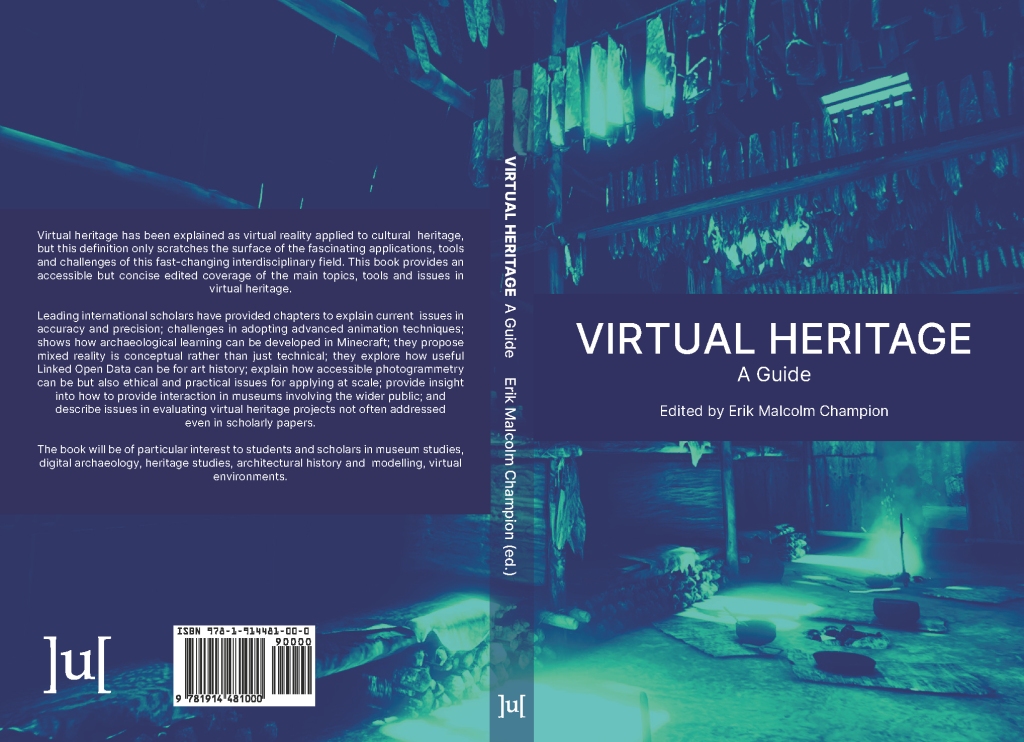
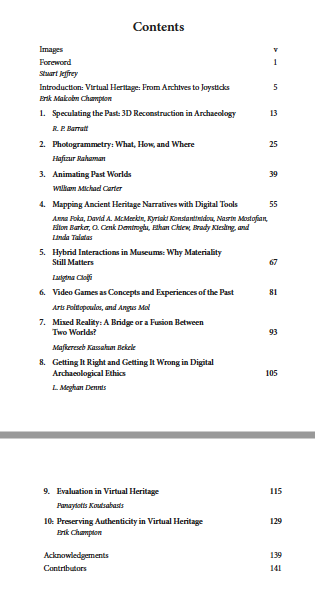
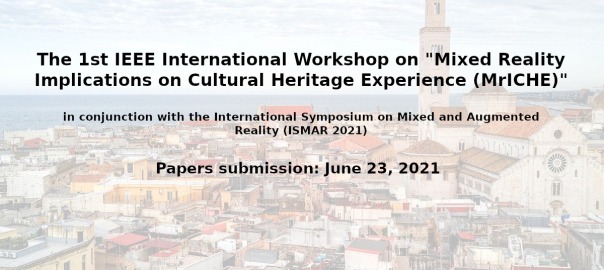
ISMAR workshop MrICHE
#CFP I was invited onto the program committee for IEEE International Workshop on “Mixed Reality Implications on Cultural Heritage Experience (MrICHE)”.
The workshop will be held in conjunction with the International Symposium on Mixed and Augmented Reality (ISMAR 2021, https://ismar21.org), 4-8 October 2021, Bari, Italy.
Submit: 4-8 page papers by 23 June! IEEE format. https://fcrlab.unime.it/calls/mriche2021 #ismar #culturalheritage #mixedreality #augmentedreality

“Workshopping Board Games for Space, Place, and Culture” revised chapter, authored with Juan Hiriart, for “Playing Place” (edited by Medina Lasansky and Chad Randl, MIT Press) sent off today. Each chapter has a 1000 word limit, I believe. Took me some time to trim this! Great to work with Juan on a chapter, I think our different strengths blend well. When (or if?) the book appears on MIT Press I will add another post, the list of authors and topics looks really good, possibly essential reading if you are into boardgames, or are not, but want to know why so many people are …
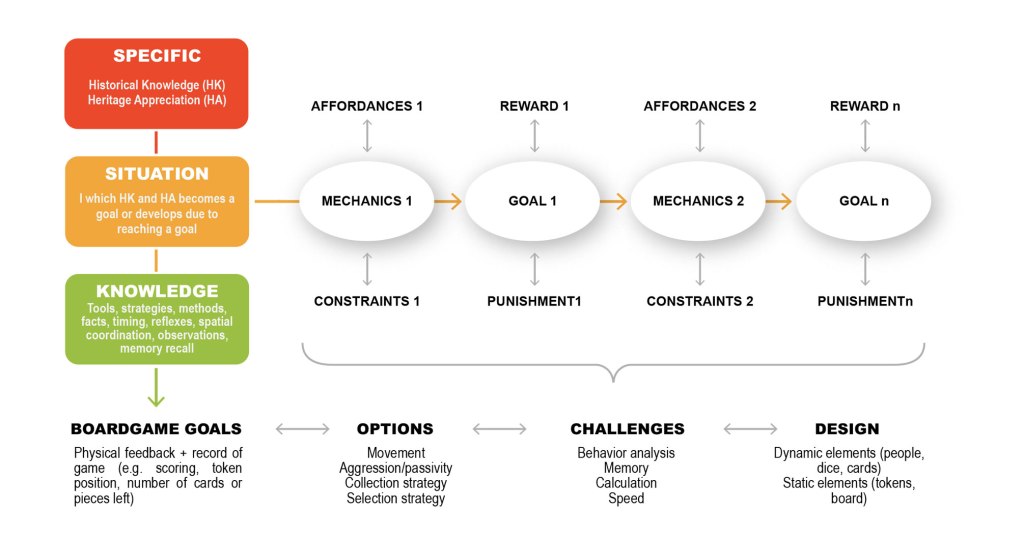
Workshopping Board Games for Space, Place, and Culture
Conveying built heritage values and historical knowledge through boardgame design may seem an odd decision. Communicating space, place, and culture through play is a challenge let alone through a medium inherently incapable of evoking the direct experience of inhabitation and architecture as a spatial art. Boardgames are engaging, social, quick to make, and fast to learn, intuitive or nuanced. From the complex to the spontaneous, boardgames can be effective, visceral tools for cultural immersion, challenging cultural assumptions and preconceptions, encouraging discussion and collaboration between players, provoking insight and enjoyment with simple props or intricate rules.
The following explains our experience hosting participative design workshops with historians, archaeologists, and heritage professionals. In small groups of three to four people, participants determine the design decisions, discussing and solving problems that often arise in an iterative process where historical research, game design, and play-testing both blend and butt heads.
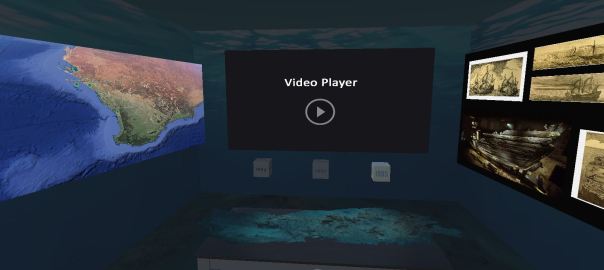
Paper and Proceedings Published
EuroMed2020 conference proceedings have been published by Springer.
Ioannides, M., Fink, E., Cantoni, L., Champion, E. (Eds.). Digital Heritage. Progress in Cultural Heritage: Documentation, Preservation, and Protection. 8th International Conference, EuroMed 2020, Virtual Event, November 2–5, 2020, Revised Selected Papers. Springer.
Our paper: Champion, E., Kerr, R., McMeekin, D., & Rahaman, H. (2020, 29 October-3 November). Time-Layered Gamic Interaction with a Virtual Museum Template. Paper presented at the EuroMed 2020 Conference, Nicosia, Cyprus (online).
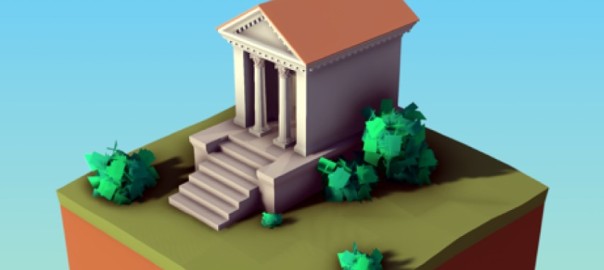
Books on the way (I think)..
Books to be on the way
- Champion, E. (2021: in press). Rethinking Virtual Places. Indiana University Press, Spatial Humanities series. In a week they should be sending me the first proof.
- Champion, E. (Ed). (2021: in press). Virtual Heritage: A Guide. Ubiquity Press, London. All the chapters have been sent to the publisher and they go to print very quickly, in my experience. Open Access.
- Lee, C. & Champion, E. (Ed). (2022: pending). Screen Tourism and Affective Landscapes. This is still under consideration but some authors have already sent complete chapters so I think it is just a case of helping out my overloaded co-editor. Oh and overcoming field trips stopped by Covid.
- Champion, E., & Hiriart, J. (Eds.). (2022 (needs to be submited to academic review)). Assassin’s Creed in the Classroom, Museum, and Gallery: De Gruyter: Video games and the Humanities series. This is to be submitted but have very enthusiastic editor and series editors to help us complete it. For some reason I will particularly look forward to the reviews. 25 authors, 19 chapters, about 90,000 words and no grayscale image limits. We may have abstracts available in foreign languages. Ubisoft people may help us out as well, they have been very supportive so far.
Virtual Heritage: A Guide
I am not sure this will be the final title but just finished (I hope) my editing for the following open access 10 chapter book: Virtual Heritage: A Guide, Ubiquity Press 2021.
Table of contents:
| Foreword | Stuart Jeffrey | |
| Virtual Heritage: from Archives to Joysticks | Ear Zow Digital | |
| 1 | Speculating the Past: 3D Reconstruction in Archaeology | R. P. Barratt |
| 2 | Photogrammetry: What, How and Where | Hafizur Rahaman |
| 3 | Animating the Past | Michael Carter |
| 4 | Mapping Ancient Heritage With Digital Tools | Anna Foka, David McMeekin, Kyriaki Konstantinidou, Nasrin Mostofian, Elton Barker, Cenk Demiroglu, Ethan Chiew, Brady Kiesling |
| 5 | Hybrid Interactions in Museums: Why Materiality Still Matters | Luigina Ciolfi |
| 6 | Video Games as concepts and experiences of the past | Aris Politopoulos, Angus Mol |
| 7 | Mixed Reality: A Bridge or a Fusion between Two Worlds? | Mafkereseb Bekele |
| 8 | Getting it Right and Getting it Wrong in Digital Archaeological Ethics | L. Meghan Dennis |
| 9 | Evaluation in Virtual Heritage | Panayiotis Koutsabasis |
| 10 | Preserving Authenticity in Virtual Heritage | Ear Zow Digital |
Virtual Archaeology Review’s Paper of the Year
Virtual Archaeology Review declared my and Dr Rahaman’s 2020 paper “Survey of #3D digital heritage repositories and platforms” their paper of the year.
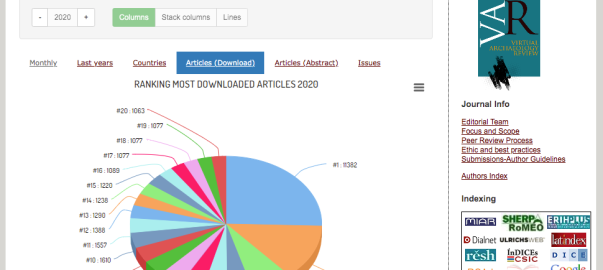
Article popularity
I am impressed that the Virtual Archaeology Review Journal (@VARjournal) has a stats page with % comparing views to downloads and abstracts listed (and a 3D -model- filter!) It can help authors check their abstract is on target (i.e. catchy). Our (with Dr Hafizur Rahaman @hafi2018) 2020 article Survey of 3D digital heritage repositories and platforms was 6th most downloaded article (3rd for 2020). NB had trouble viewing, had to refresh several times.
CHAMPION, Erik; RAHAMAN, Hafizur. Survey of 3D digital heritage repositories and platforms. Virtual Archaeology Review, [S.l.], v. 11, n. 23, p. 1-15, July 2020. ISSN 1989-9947. Available at: <https://polipapers.upv.es/index.php/var/article/view/13226>. Date accessed: 04 Jan. 2021. doi:https://doi.org/10.4995/var.2020.13226.
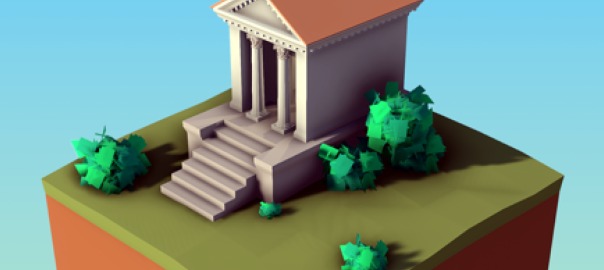
New book cover

Was one of two book covers possible and I think due to some email confusion they didn’t choose my preferred cover but I really appreciate permission by Dr Anthony Masinton to use his rendered image. The publisher of Rethinking Virtual Places will be Indiana University Press, via their Spatial Humanities Series.
New Journal Article!
Champion, E. (2020). Culturally Significant Presence in Single-player Computer Games. Journal on Computing and Cultural Heritage, 13(4). doi:10.1145/3414831. https://dl.acm.org/doi/10.1145/3414831
Cultural presence is a term used to explain and evaluate cultural learning in virtual heritage projects but is less frequently used for video games. Given the increasing importance of video games to cultural heritage, this article investigates explanations of cultural presence that could be communicated by games, especially concerning UNESCO and ICOMOS definitions of cultural significance. The aim is to determine if cultural presence can be communicated via video games and across a range of game genres.
Observations derived from game prototyping workshops for history and heritage aided the development of a teachable list of desirable game elements. To distinguish itself from the vagueness surrounding theories of cultural presence, a theory of culturally significant presence is proposed. Culturally significant presence requires three components: culturally significant artifacts and practices; an overarching framework of a singular, identifiable cultural viewpoint; and awareness by the participant of both the culturally significant and the overarching cultural framework and perspective (which gives sites, artifacts, and practices their cultural significance and relational value).
As awareness of cultural presence requires time for reflection, single-player games were chosen that were not completely dependent on time-based challenges. Another criterion was cultural heritage content: They must simulate aspects of heritage and history, communicate a specific cultural framework, or explore and reconstruct a past culture. Four games were chosen that simulate a culture, explain archaeological methods, portray indigenous intangible heritage, or explain historical-based ecosystems of the past based on educational guidelines. The games are Assassin’s Creed: Origins; Heaven’s Vault; Never Alone; and a Ph.D. project: Saxon. Their genres could be described as first-person shooter/open world/virtual tour; dialogue-based puzzle game; 2D platform game; and turn-based strategy game.
The aim is not to evaluate the entire range of interactive virtual environments and games, but to examine the applicability and relevance of this new theory and to ascertain whether the four games provided useful feedback on the concept and usefulness of culturally significant presence. A more clearly demarcated theory may not only help focus evaluation studies but also encourage game developers to modify or allow modification of commercial games for classroom teaching of digital heritage.

